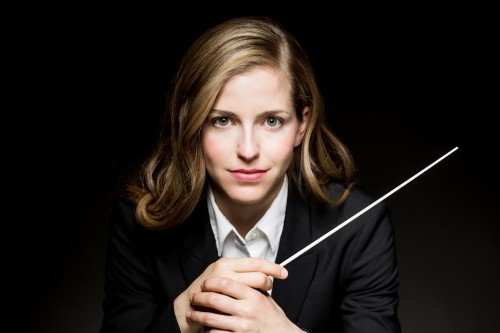 United Kingdom Larcher, Beethoven: Thomas Oliemans (baritone), BBC Symphony Orchestra / Karina Canellakis (conductor). Barbican Hall, London, 8.2.2019. (CC)
United Kingdom Larcher, Beethoven: Thomas Oliemans (baritone), BBC Symphony Orchestra / Karina Canellakis (conductor). Barbican Hall, London, 8.2.2019. (CC)

Larcher – Alle Tage (2010-15, UK premiere)
Beethoven – Symphony No.7 in A, Op.92
Karina Canellakis made her conducting debut as recently as 2014, on the encouragement of Sir Simon Rattle, no less (as a violinist, she had been a member of the Berliner Philharmoniker’s Orkester Akademie: she trained in violin at the Curtis Institute, Philadelphia and the Juilliard School, New York). She certainly impressed my colleague John Quinn in Birmingham in 2017 (review) while Claire Seymour was a touch less taken by her 2018 Prom with the BBCSO (review). Canellakis’s technique is superb: crystal clear, expressive and often markedly dynamic. Coupled with this is a ferocious intelligence, both in her ability to negotiate the complexities of the Larcher and to bring freshness and new interpretative ideas to core Beethoven.
So to the premiere of the evening. It has been a time of awards for composer Thomas Larcher: in December 2018, the Ernst Krenek Prize of the City of Vienna; just two months earlier, in October 2018, ‘Le Prix de Composition Musicale’ of Fondation Prince (Monaco) for Symphony No.2, ‘Kenotaph’. That Second Symphony has been championed by Semyon Bychkov (see my 2016 Proms review of the UK premiere); the following year, Christian Tetzlaff gave the UK premiere of Nocturne – Insomnia with the Scottish CO and Ticciati, again at the Proms: review. That latter piece has a soundworld coloured by the accordion; as does Alle Tage, that accordion’s colouring of the familiar just one example of Larcher’s almost impossibly sensitive ear for sonority.
Larcher’s Alle Tage (2010-15) received its world premiere with Matthias Goerne as soloist, the Netherlands Radio Orchestra and Jaap van Sweden; this present performance was the UK premiere, with Thomas Oliemans. I enjoyed Oliemans’s assumption of the role of Figaro (The Marriage of Figaro) at ENO in March last year (review); he was if anything even finer here. Larcher’s work sets the poetry of Austrian Ingeborg Bachmann (who has written two librettos for Hans Werner Henze, Der junge Lord and Der Prinz von Homburg). There are four poems (‘Anrufung des Großen Bären’, ‘Mein Vogel’, ‘Heimweg’ and the titular ‘Alle Tage’) but seven movements. An Introduction prefaces ‘Anrufung des Großen Bären’, and there are two purely orchestral movements, ‘Remembrance’ and ‘Storm, War’ separating ‘Heimweg’ and ’Alle Tage’. Overarching all of this is a quasi-traditional formal outline of Introduction, first movement, a more intimate movement and scherzo (the first three songs), a slow movement comprising the two purely orchestral panels and Epilogue (‘Alle Tage’). The work is intense and complex. Antiphonal violins helped to elucidate string textures. A superb flugelhorn solo (Gustav Melander) sets the scene, territory that is, at this point, more post-Romantic than modernist.
At the entry of the voice, Oliemans established himself as a strong, rich–voiced soloist, his diction perfectly judged. Vocal lines throughout tended to be long, disjunct, but very lyrical. Textures and harmonies now turning towards the Bergian, Larcher allowed in more modernist touches. With ‘Mein Vogel’, a text with such powerful Nature imagery one could easily imagine a (Robert) Schumann setting, Larcher’s expansiveness opened out. The accordion added an individual touch to Larcher’s writing, while ‘Heimweg’ emerged as a glistening Schoenbergian scherzo, complete with vocal writing that veered towards Sprechgesang. Larcher does include some hints of tonality, though; his is an all-inclusive harmonic world, masterly manipulated, that can morph as required by the situation.
The two orchestral movements run for about 20 minutes, combined. Elements of Nachtmusik characterise ‘Remembrance’, music which takes that original flugelhorn solo and distorts it through a dark prism, while a sudden scherzo asserts itself in the ‘Storm, War’ panel. Suddenly the music is hyper-gestural, eventually finding a unison over which an unearthly accordion plays and high cellos give the ‘ticking’ that has been so much a part of this piece. Finally, the desolate Epilogue, accordion now colouring the brass, the final ascending gesture on clarinets and accordion carrying the music upwards into a (for us) silent ether.
Throughout, Cannelakis was incredibly clear and expressive. She clearly has an intimate knowledge of the score, and it showed in the BBC Symphony Orchestra’s hair-trigger response.
Canellakis’s Beethoven was revelatory, that annunciatory opening chord confidently together, setting the scene for a reading of the utmost assurance from both conductor and orchestra. The first movement, exposition repeat intact, held moments of great power, the beginning of the development markedly gestural, the counterpoint thereafter nicely gentle. A lovely oboe solo from Bobby Chen in that tiny bit of micro-freedom Beethoven affords his player was a little miracle. The famous Allegretto was marked by its sense of organic growth, the scherzo furiously energetic (the Trio holding very carefully rehearsed hairpins). Baton back over her shoulder Salonen-style, and the Allegro con brio finale was launched, ultra-rapid, ultra-accurate. A dazzling, dizzying performance.
A small point, one of curiosity rather than adverse criticism: why Canellakis used four horns, I remain unsure. Beethoven only wrote two parts, and it was not as if all four were used at the great perorations (the ends of the first and fourth movements). The horns were arranged in two pairs, also, rather than interspersing if this had been a bumper scenario.
Anyway, Larcher is not the only person being garlanded with awards. At the end of the concert, Canellakis was awarded the Critics’ Circle 2018 Emerging Talent (Conductor) award by Mark Pullinger, Chair of the Critics’ Circle. Other winners of Emerging Talent 2018 are pianist Federico Colli, whose Chandos recordings have so far been exceptional, soprano Jennifer France and composer Kate Whitley. For Canellakis, it is a richly deserved reward.
Colin Clarke
